NegoSim: A Modular and Extendable Automated Negotiation Simulation Platform Considering EUBOA
Abstract
1. Introduction
- This paper proposes NegoSim, a new negotiation simulator. Protocols, negotiating parties, and analytic tools are three critical components of each negotiation platform, and these three components are completely modular and extendable in NegoSim.
- We develop NegoSim and make it available to all users. This modularity gives users complete control over the development of negotiating agents, negotiation protocols, and analytic tools based on their specific needs.
- NegoSim introduces a new negotiation framework called EUBOA, although it is based on the underlying well-known BOA framework.
- These analytic tools enable researchers to examine massive amounts of redundant negotiation data. Examples of predefined agents, protocols, and analytic tools demonstrate that NegoSim is an appropriate platform for researchers.
2. NegoSim and Agent Architecture
2.1. Agent
- Directly developing an agent using agent-development APIs: NegoSim provides some simple APIs for developing agents. The only thing the developer needs to consider is which bid to send when the protocol requests one (agents communicate with each other by exchanging offers via a protocol) without distracting the user with other issues. The developer must only consider making an offer, which is an initial offer to begin a negotiation, a counteroffer in response to the opponent, or ending the negotiation. The agent developers should then consider a method for determining the best time to accept the opponents. They can also create an opponent modeling entity to approximate the opponent’s preferences.
- Creating an agent with the BOA framework for certain conditions and the EUBOA framework for uncertain conditions, see Section 2.1.2.
2.1.1. Utility Space
2.1.2. EUBOA Framework
- Elicitation strategy: This component solicits the user’s initial partial preferences as well as the modeling component question.
- a.
- Input: a possible outcome of domain space
- b.
- Output: the rank of the bid
- Estimation components: The user modeling and opponent modeling components comprise estimation components.
- c.
- User modeling: This component predicts the user’s preference profile.
- i.
- Input: orders the possible outcomes of domain space
- ii.
- Output: updates user preferences
- d.
- Opponent modeling: This component predicts the opponent’s preference profile.
- i.
- Input: opponent’s bids.
- ii.
- Output: the estimated opponent preference profile.
- Bidding strategy: This component determines the best bid to send to the opponent.
- e.
- Input: the user’s preference profile generated by the user modeling component, the opponent’s preference profile generated by the opponent modeling component, and the negotiation’s remaining time
- f.
- Output: a bid to send to the opponent.
- Acceptance strategy: This component determines whether or not to accept the opponent’s offer.
- g.
- Input: user preference profile generated by the user modeling component, opponent preference profile generated by opponent modeling, bid generated by the bidding strategy to send to the opponent, and remaining time in the negotiation
- h.
- Output: an action: accept the opponent’s offer, send a bid, or end the negotiation
2.2. Protocol
2.3. Negotiation Table
2.4. Analysis Module
3. Environment of NegoSim
3.1. Negotiation Session
3.2. Negotiation Tournament
4. Conclusions
Author Contributions
Funding
Institutional Review Board Statement
Informed Consent Statement
Data Availability Statement
Conflicts of Interest
References
- Fatima, S.; Kraus, S.; Wooldridge, M. Principles of Automated Negotiation; Cambridge University Press: Cambridge, UK, 2014. [Google Scholar]
- de Jonge, D.; Bistaffa, F.; Levy, J. A heuristic algorithm for multi-agent vehicle routing with automated negotiation. In Proceedings of the 20th International Conference on Autonomous Agents and Multiagent Systems (AAMAS 2021), Virtual, 3–7 May 2021; pp. 404–412. [Google Scholar]
- Alba, F.L.D.; González-Briones, A.; Chamoso, P.; Pinto, T.; Vale, Z.; Corchado, J.M. A P2P electricity negotiation agent systems in urban smart grids. In Advances in Intelligent Systems and Computing 17th International Conference of Distributed Computing and Artificial Intelligence (DCAI 2020); Springer: Berlin/Heidelberg, Germany, 2021; p. 1242. [Google Scholar]
- de la Hoz, E.; Marsá-Maestre, I.; Giménez-Guzmán, J.M.; Orden, D.; Klein, M. Multi-agent nonlinear negotiation for wi-fi channel assignment. In Proceedings of the 16th Conference on Autonomous Agents and Multiagent Systems (AAMAS 2017), São Paulo, Brazil, 8–12 May 2017; pp. 1035–1043. [Google Scholar]
- Cao, M.; Luo, X.; Luo, X.R.; Dai, X. Automated negotiation for e-commerce decision making: A goal deliberated agent architecture for multi-strategy selection. Decis. Support. Syst. 2015, 73, 1–14. [Google Scholar] [CrossRef]
- Mohammad, Y.; Viqueira, E.A.; Ayerza, N.A.; Greenwald, A.; Nakadai, S.; Morinaga, S. Supply chain management world. In Proceedings of the 22nd International Conference on Principles and Practice of Multi-Agent Systems (Prima 2019), Turin, Italy, 28–31 October 2019; pp. 153–169. [Google Scholar] [CrossRef]
- Jonker, C.M.; Aydoğan, R.; Baarslag, T.; Broekens, J.; Detweiler, C.A.; Hindriks, K.V.; Huldtgren, A.; Pasman, W. An introduction to the pocket negotiator: A general purpose negotiation support system. Lect. Notes Comput. Sci. 2017, 27, 13–27. [Google Scholar] [CrossRef]
- Lin, R.; Kraus, S.; Baarslag, T.; Tykhonov, D.; Hindriks, K.; Jonker, C.M. Genius: An integrated environment for supporting the design of generic automated negotiators. Comput. Intell. 2014, 30, 48–70. [Google Scholar] [CrossRef]
- Mohammad, Y.; Nakadai, S.; Greenwald, A. Negmas: A platform for situated negotiations. In Studies in Computational Intelligence International Workshop on Agent-Based Complex Automated. Negotiation; Springer: Singapore, 2021; Volume 75, pp. 57–75. [Google Scholar] [CrossRef]
- Baarslag, T.; Aydoğan, R.; Hindriks, K.V.; Fujita, K.; Ito, T.; Jonker, C.M. The automated negotiating agents competition, 2010–2015. AI Mag. 2015, 36, 115–118. [Google Scholar] [CrossRef]
- Baarslag, T.; Hindriks, K.; Jonker, C.; Kraus, S.; Lin, R. The first automated negotiating agents competition (ANAC 2010). In New Trends in Agent-Based Complex Automated Negotiations; Ito, T., Zhang, M., Robu, V., Fatima, S., Matsuo, T., Eds.; Springer: Berlin/Heidelberg, Germany, 2012; pp. 113–135. [Google Scholar] [CrossRef]
- Baarslag, T.; Fujita, K.; Gerding, E.H.; Hindriks, K.; Ito, T.; Jennings, N.R.; Jonker, C.; Kraus, S.; Lin, R.; Robu, V.; et al. Evaluating practical negotiating agents: Results and analysis of the 2011 international competition. Artif. Intell. 2013, 198, 73–103. [Google Scholar] [CrossRef]
- Marsá-Maestre, I.; Klein, M.; Jonker, C.M.; Aydoğan, R. From problems to protocols: Towards a negotiation handbook. Decis. Support. Syst. 2014, 60, 39–54. [Google Scholar] [CrossRef]
- Baarslag, T.; Hindriks, K.; Hendrikx, M.; Dirkzwager, A.; Jonker, C. Decoupling negotiating agents to explore the space of negotiation strategies. Stud. Comput. Intell. 2014, 83, 61–83. [Google Scholar] [CrossRef]
- Baarslag, T.; Hendrikx, M.J.C.; Hindriks, K.V.; Jonker, C.M. Learning about the opponent in automated bilateral negotiation: A comprehensive survey of opponent modeling techniques. Auton. Agents Multi-Agent Syst. 2016, 30, 849–898. [Google Scholar] [CrossRef]
- Bakker, J.; Hammond, A.; Bloembergen, D.; Baarslag, T. RLBOA: A modular reinforcement learning framework for autonomous negotiating agents. In Proceedings of the 18th International Conference on Autonomous Agents and Multiagent Systems (AAMAS2019), Montreal, QC, Canada, 13–17 May 2019; pp. 260–268. [Google Scholar]
- Filipczuk, D.; Baarslag, T.; Gerding, E.H. Schraefel, mc Automated privacy negotiations with preference uncertainty. Auton. Agents Multi-Agent Syst. 2022, 36, 49. [Google Scholar] [CrossRef]
- Aydoğan, R.; Festen, D.; Hindriks, K.V.; Jonker, C.M. Alternating offers protocols for multilateral negotiation. In Modern Approaches to Agent-Based Complex Automated Negotiation; Springer: Berlin/Heidelberg, Germany, 2017; pp. 153–167. [Google Scholar] [CrossRef]
- Raiffa, H. The Art and Science of Negotiation; Harvard University Press: Cambridge, UK, 1982. [Google Scholar]
- Pandastable. Available online: https://pandastable.readthedocs.io/en/latest/ (accessed on 19 November 2022).
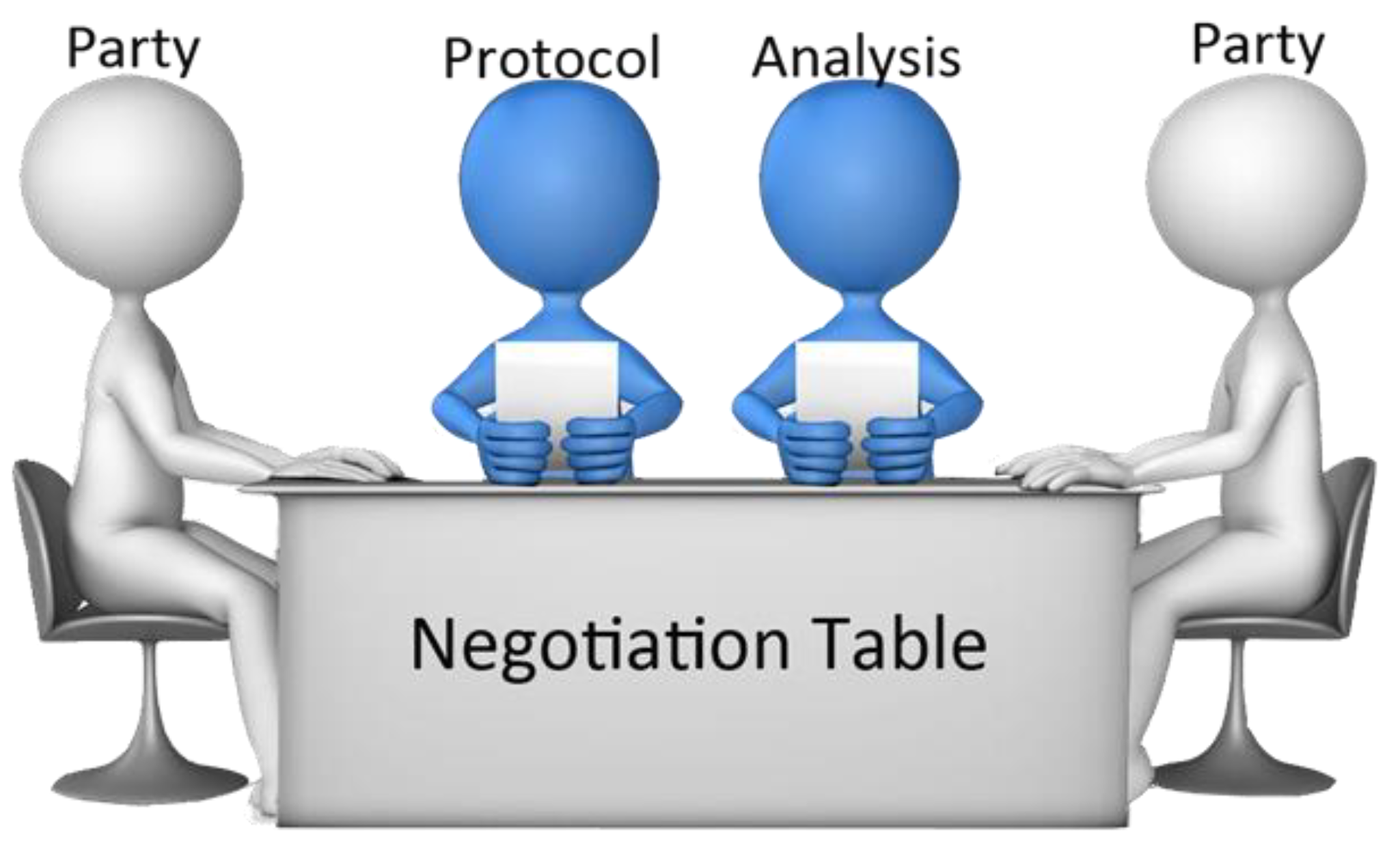
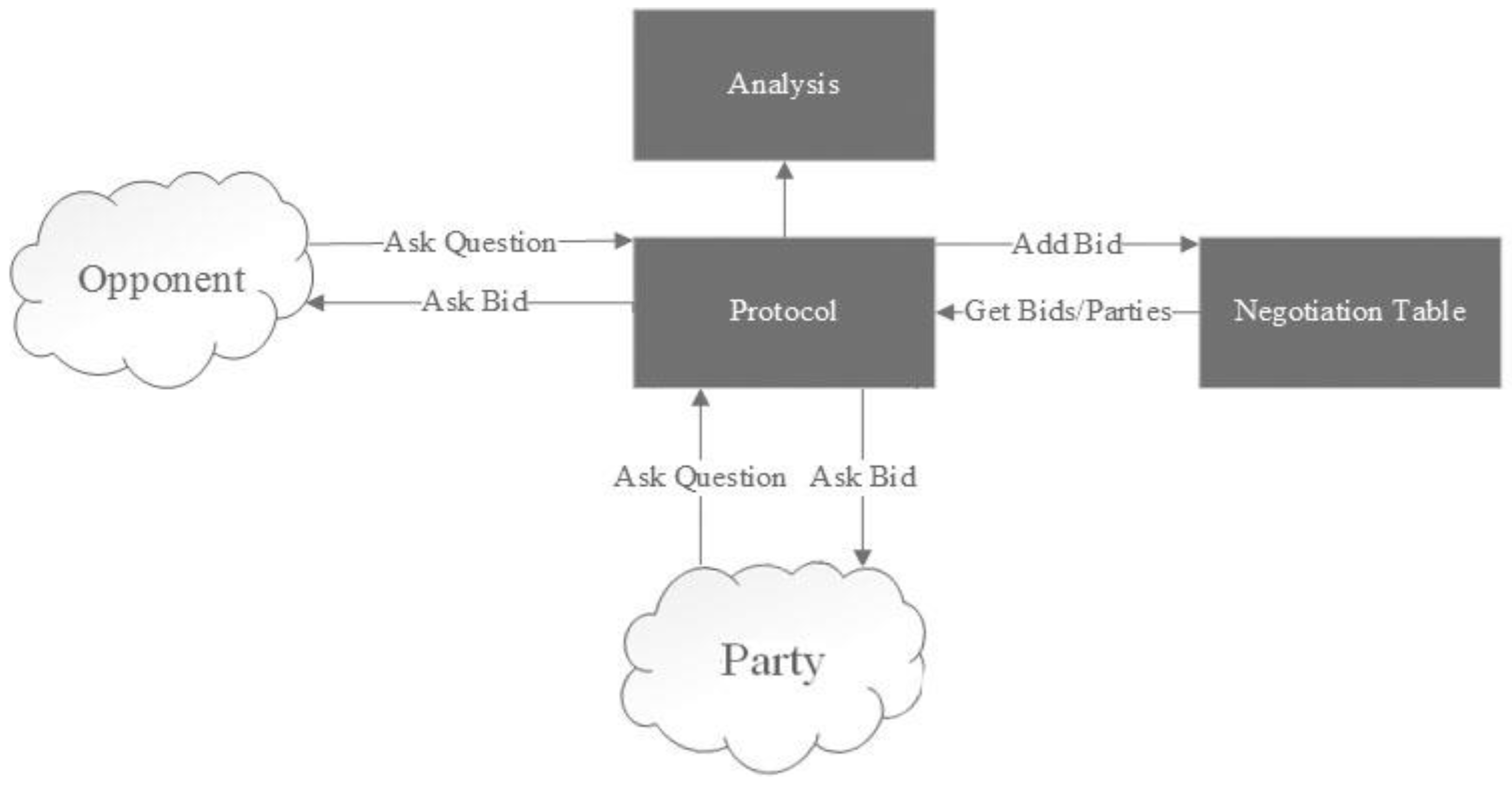


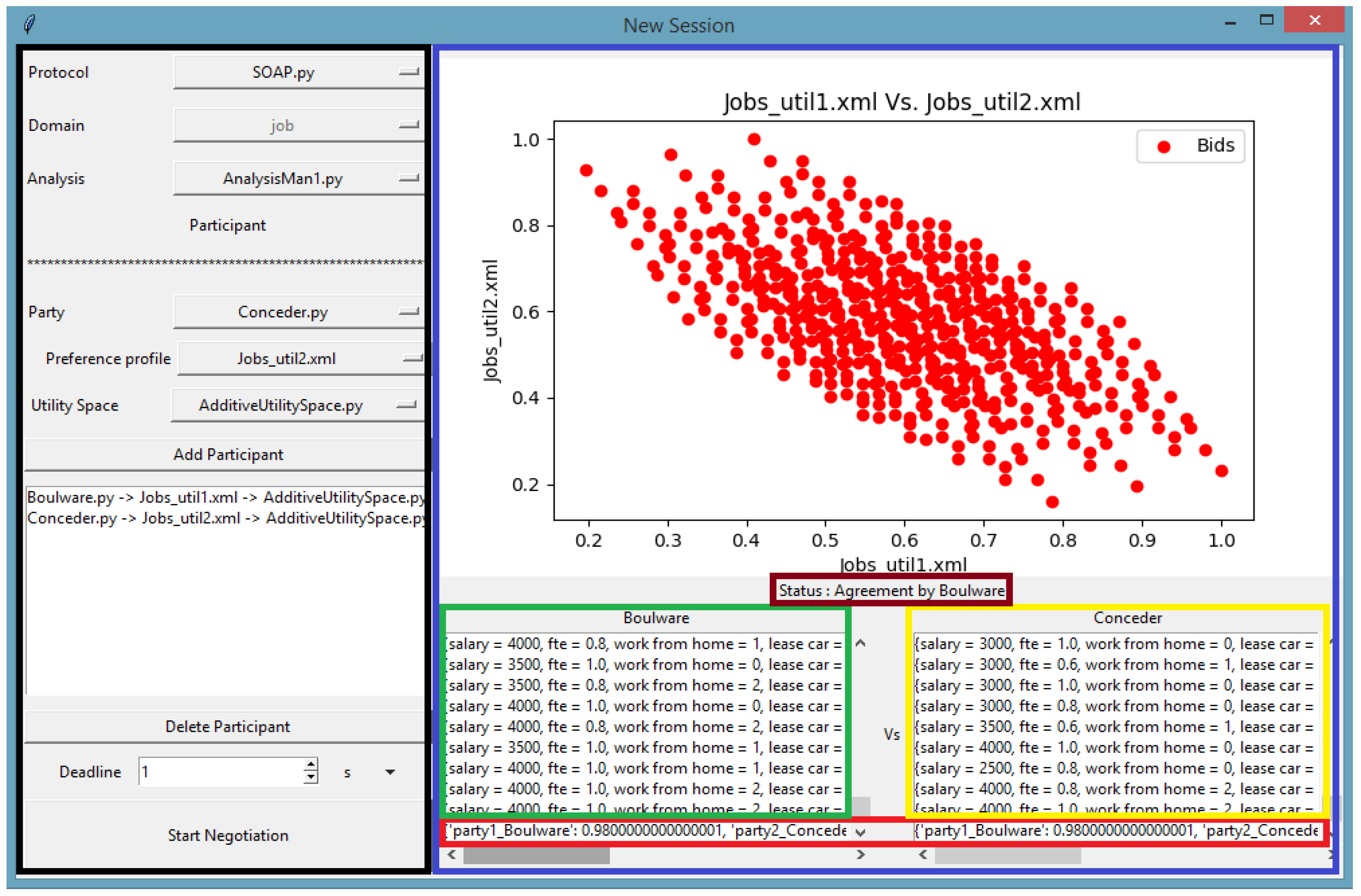
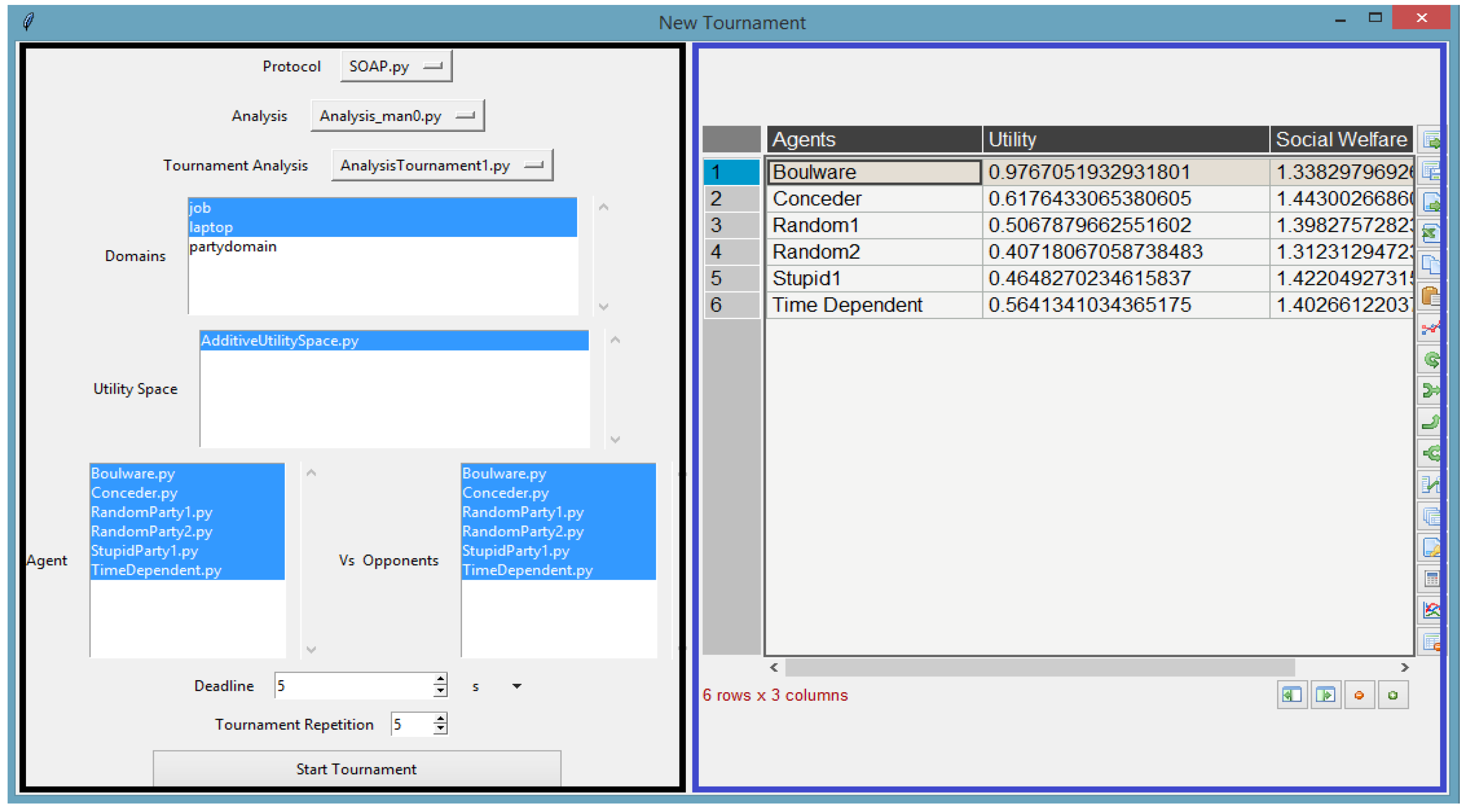
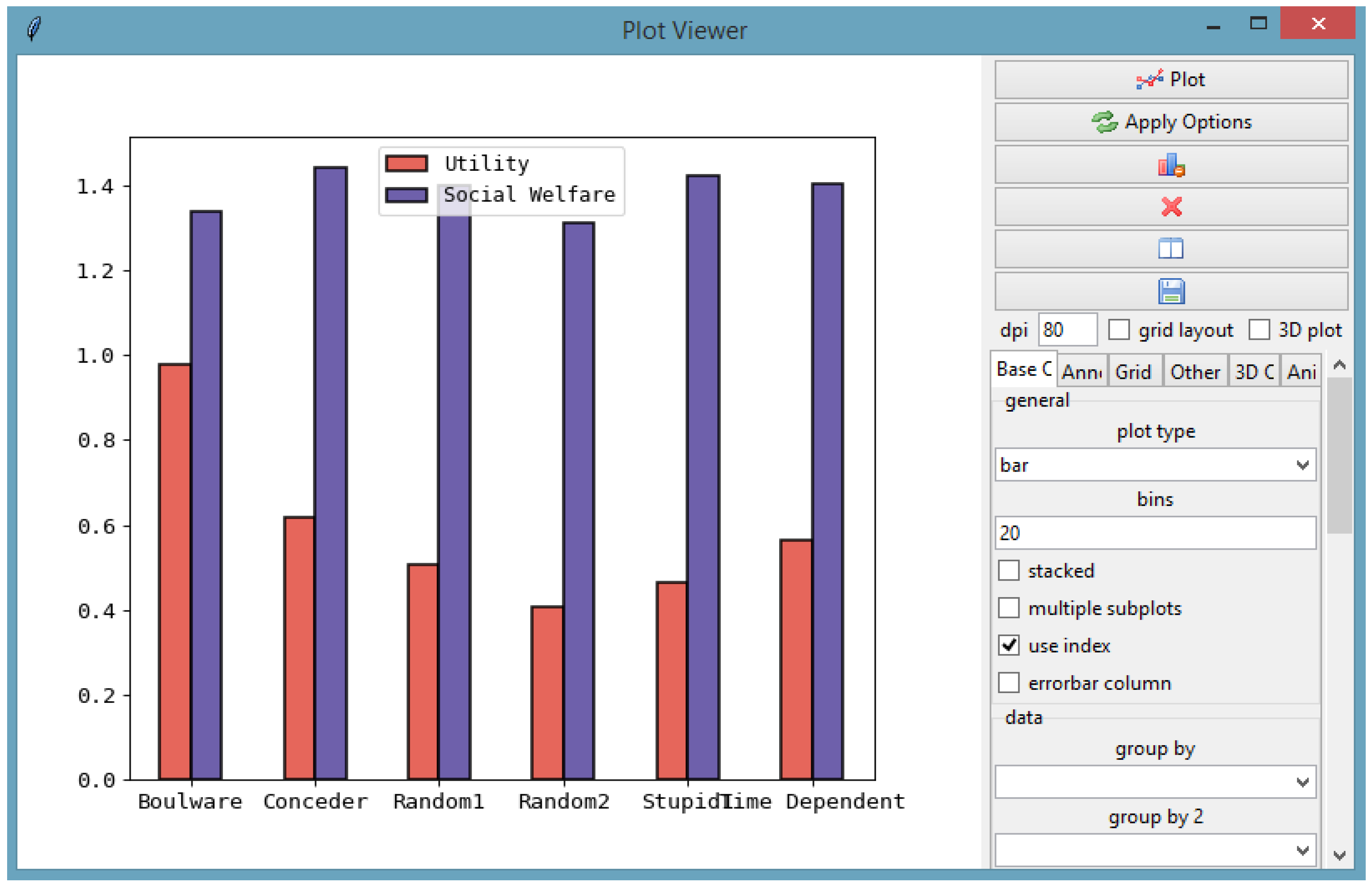
| Elicitation Strategy | User Model | Bidding Strategy | Opponent Model | Acceptance Strategy |
|---|---|---|---|---|
| - | - | - |
Disclaimer/Publisher’s Note: The statements, opinions and data contained in all publications are solely those of the individual author(s) and contributor(s) and not of MDPI and/or the editor(s). MDPI and/or the editor(s) disclaim responsibility for any injury to people or property resulting from any ideas, methods, instructions or products referred to in the content. |
© 2023 by the authors. Licensee MDPI, Basel, Switzerland. This article is an open access article distributed under the terms and conditions of the Creative Commons Attribution (CC BY) license (https://creativecommons.org/licenses/by/4.0/).
Share and Cite
Ebrahimnezhad, A.; Fujita, K. NegoSim: A Modular and Extendable Automated Negotiation Simulation Platform Considering EUBOA. Appl. Sci. 2023, 13, 642. https://doi.org/10.3390/app13010642
Ebrahimnezhad A, Fujita K. NegoSim: A Modular and Extendable Automated Negotiation Simulation Platform Considering EUBOA. Applied Sciences. 2023; 13(1):642. https://doi.org/10.3390/app13010642
Chicago/Turabian StyleEbrahimnezhad, Arash, and Katsuhide Fujita. 2023. "NegoSim: A Modular and Extendable Automated Negotiation Simulation Platform Considering EUBOA" Applied Sciences 13, no. 1: 642. https://doi.org/10.3390/app13010642
APA StyleEbrahimnezhad, A., & Fujita, K. (2023). NegoSim: A Modular and Extendable Automated Negotiation Simulation Platform Considering EUBOA. Applied Sciences, 13(1), 642. https://doi.org/10.3390/app13010642







